Living the Gospel: “My grace is sufficient for you”
Eating alone One of my colleagues never joined us for lunch in the staff canteen. No-one really liked him because he was always so bad tempered. One lunchtime I made an effort to approach him, and as we talked, he confided how much he was suffering over one of his sons who had become a drug addict. I listened with an open heart. Then the two of us went into the canteen together. The other staff noticed with surprise how well we were getting on, and after that they began treating him with respect. O.F. – Slovak Republic An honest gift I offered to help a colleague in my office organize the collection for a staff member who was retiring. When the time came to buy the gift, my colleague advised me that we only had to spend half the money collected, dividing the rest between the two of us! I protested that this was not right, but she insisted this was how it was always done. I looked at her in silence, conveying my disapproval. A short while later she came over to apologize to me, and from that day we become friends. F.M. – Italy A rose and a promise For a while now I have committed myself to opening up our parish hall so that our young people have somewhere to go after school. It’s not easy, and there is quite a lot of challenging behaviour. Once, while I was trying to break up a fight, I received a punch aimed at one of them. Shocked at what they’d done, they both fled. But a short while later, the one who had inadvertently hit me came back to give me a single rose and a promise to behave better in future. F.B. – Switzerland The intern During my internship in a hospital, one of the patients with diabetes had already lost a toe and part of his foot, and due to complications was about to have his whole leg amputated. I took his situation to heart, and went to talk to him about the impending operation. He was desperate, and I tried to console him. «Look – I said – I have a present for you, but it’s not a material gift». We read the Word of Life together. The next day, as they were taking him to the operating theatre, he saw me and said: «I have faith. Let’s believe together!». C. – Argentina My sister My sister and I were always arguing. Again and again, I wanted to make things better with her, but I lacked the courage and so never made the first move. The morning after a particularly hurtful argument, I met her in the kitchen and muttered a quick “Ciao”, but so quietly that she didn’t hear it. I knew I should repeat it with more conviction, but I worried it was below my dignity. Then I almost amazed myself as I turned to her and said a loud and heartfelt “Ciao!”. She was amazed too and we both smiled. D.B. – Italy
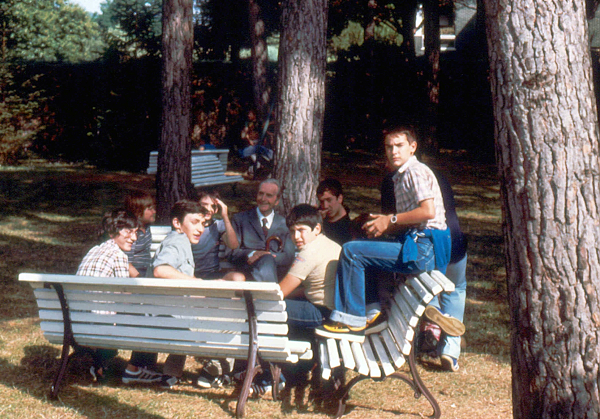
Young people want heroism
 ″You need to be young to follow Jesus, or else become young. He even asks that one becomes a child – every day and in every moment, freeing oneself from the sickness of spiritual senility. Because, if the spirit ages, it is held down and it can never soar. Therefore, one always needs to be reborn, begin again, become new: Jesus. It is often said that the youth of today are skeptical, perhaps cynical… if that’s true, it might be a case of posture or style beneath which lies the sense of amazement in front of a generation that was born in the midst of an inhumane waste of energy in the production of death. It is materialism that scares, deludes and arrests today’s youth who, by nature, react to a standard of living made up only of economic calculations and sensorial entertainment, of a singular battle for the stomach … This is the divine lesson behind this human crisis on which we pour so much makeup, tears and Coca-Cola: you can’t live without an absolute. Jesus walks by and the young people see him if the sight of him is not impeded by surgance of proud human beings, that is, people who feel that they are more than others because of their money or political power… Young people can immediately pick out the pure and divine countenance of Jesus, they leave father and mother, fiance and wealth, flattery and comfort – first on the path of the aposotolate and then Calvary. They want Christ and Christ Crucified. Christ in his entirety, all in all: only ideal. And they want his spirit, which is love: this divine blood that conquers death; which is intelligence and wisdom and bond of unity.″ Igino Giordani
″You need to be young to follow Jesus, or else become young. He even asks that one becomes a child – every day and in every moment, freeing oneself from the sickness of spiritual senility. Because, if the spirit ages, it is held down and it can never soar. Therefore, one always needs to be reborn, begin again, become new: Jesus. It is often said that the youth of today are skeptical, perhaps cynical… if that’s true, it might be a case of posture or style beneath which lies the sense of amazement in front of a generation that was born in the midst of an inhumane waste of energy in the production of death. It is materialism that scares, deludes and arrests today’s youth who, by nature, react to a standard of living made up only of economic calculations and sensorial entertainment, of a singular battle for the stomach … This is the divine lesson behind this human crisis on which we pour so much makeup, tears and Coca-Cola: you can’t live without an absolute. Jesus walks by and the young people see him if the sight of him is not impeded by surgance of proud human beings, that is, people who feel that they are more than others because of their money or political power… Young people can immediately pick out the pure and divine countenance of Jesus, they leave father and mother, fiance and wealth, flattery and comfort – first on the path of the aposotolate and then Calvary. They want Christ and Christ Crucified. Christ in his entirety, all in all: only ideal. And they want his spirit, which is love: this divine blood that conquers death; which is intelligence and wisdom and bond of unity.″ Igino Giordani
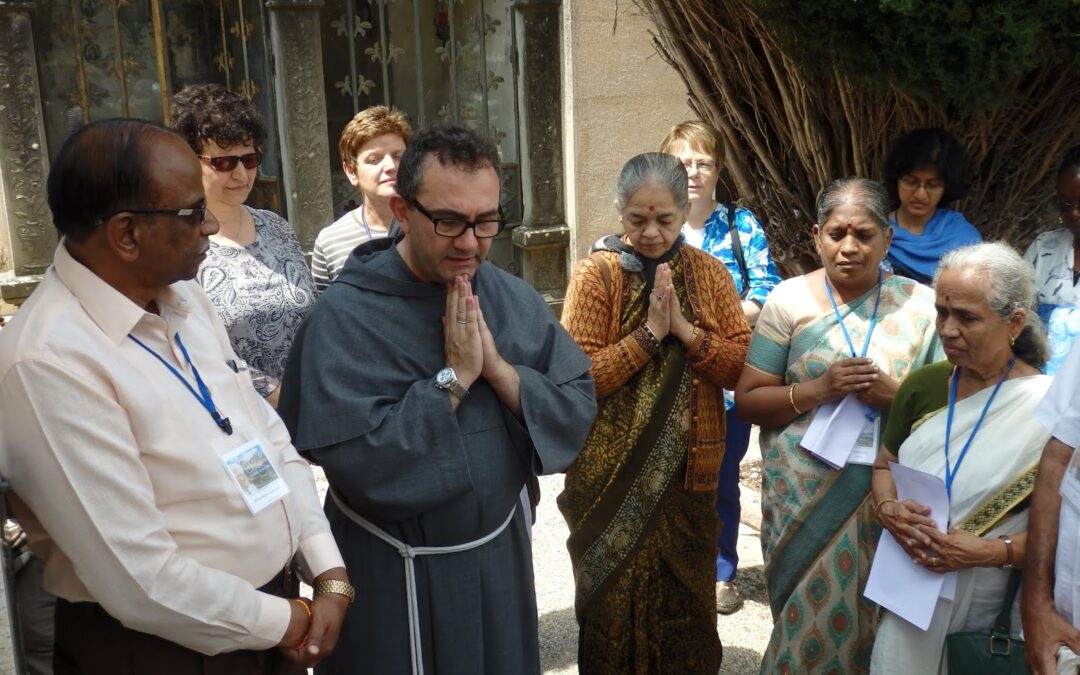
Hindu delegation visits Loppiano and Assisi: a meeting of hearts and minds
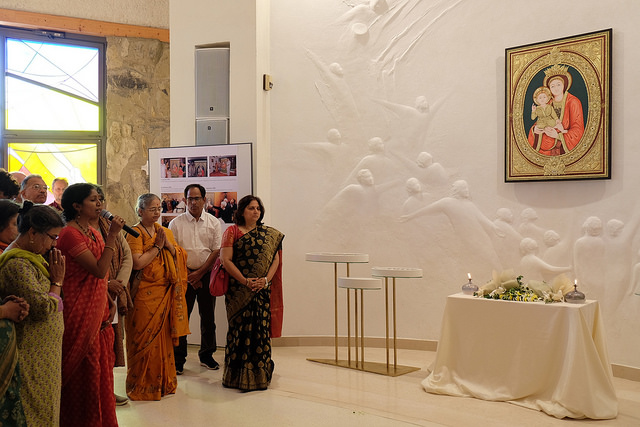 “Our Hindu-Christian delegation had two motives for visiting Loppiano. They hoped to explore and deepen their understanding of the very original experience that the Sophia Institute offers. They also wanted to commemorate the fifteenth anniversary of their presentation to the Movement of a painting of the Virgin Mary. The painting is the work of a Hindu artist and is now adorning one of the walls of the Theotokos Church in the little town. The dialogue with the staff and students at Sophia was deep and enriching. Indian academics have a considerable interest in inter disciplinary formation in dialogue. The exchange and thoughtful comparisons made by the participants increased understanding among everyone present and it became obvious that Sophia Institute is similar to some of the academic centres that inspired Mahatma Gandhi. We hope that we will soon be able to introduce courses on this great apostle of dialogue at the university in Loppiano.
“Our Hindu-Christian delegation had two motives for visiting Loppiano. They hoped to explore and deepen their understanding of the very original experience that the Sophia Institute offers. They also wanted to commemorate the fifteenth anniversary of their presentation to the Movement of a painting of the Virgin Mary. The painting is the work of a Hindu artist and is now adorning one of the walls of the Theotokos Church in the little town. The dialogue with the staff and students at Sophia was deep and enriching. Indian academics have a considerable interest in inter disciplinary formation in dialogue. The exchange and thoughtful comparisons made by the participants increased understanding among everyone present and it became obvious that Sophia Institute is similar to some of the academic centres that inspired Mahatma Gandhi. We hope that we will soon be able to introduce courses on this great apostle of dialogue at the university in Loppiano. 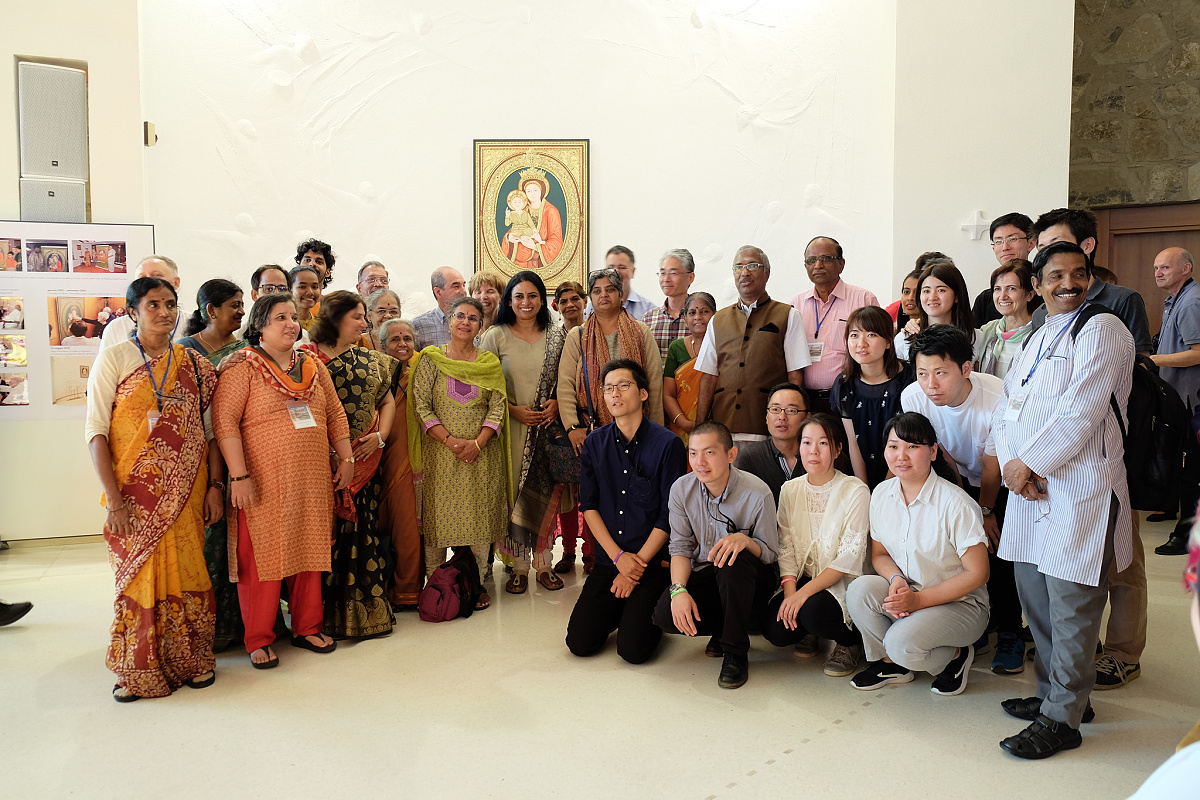 The seminar on Theology and the Practice of Dialogue was very interesting. There were not only the members of the delegation present but also many students and adults from the little town. Even though the subject is very topical, it was completely new to some people. In the evening, the Hindus came in procession to the Theotokos bringing flowers and garlands for the image of Mary. Gen Verde sang in the background. The reverence and solemnity created a deeply spiritual atmosphere. They spontaneously prayed in Sanskrit, Tamil and English and then there was the sacred moment of silence. Silence is an essential part of being oriental: in contrast, how uncomfortable it is for people from the west! It is as if people are not used to it or they are afraid to think too deeply about themselves. When cultures and religions meet with men and women of true faith, there is no need for compromise, syncretism or anomaly of any kind. Each gesture, each word, each moment of silence speaks of the Absolute. Everyone listens to it on their own wave length but the vibrations – as the Indians say – are always the same and penetrate the depths of the heart.”
The seminar on Theology and the Practice of Dialogue was very interesting. There were not only the members of the delegation present but also many students and adults from the little town. Even though the subject is very topical, it was completely new to some people. In the evening, the Hindus came in procession to the Theotokos bringing flowers and garlands for the image of Mary. Gen Verde sang in the background. The reverence and solemnity created a deeply spiritual atmosphere. They spontaneously prayed in Sanskrit, Tamil and English and then there was the sacred moment of silence. Silence is an essential part of being oriental: in contrast, how uncomfortable it is for people from the west! It is as if people are not used to it or they are afraid to think too deeply about themselves. When cultures and religions meet with men and women of true faith, there is no need for compromise, syncretism or anomaly of any kind. Each gesture, each word, each moment of silence speaks of the Absolute. Everyone listens to it on their own wave length but the vibrations – as the Indians say – are always the same and penetrate the depths of the heart.” 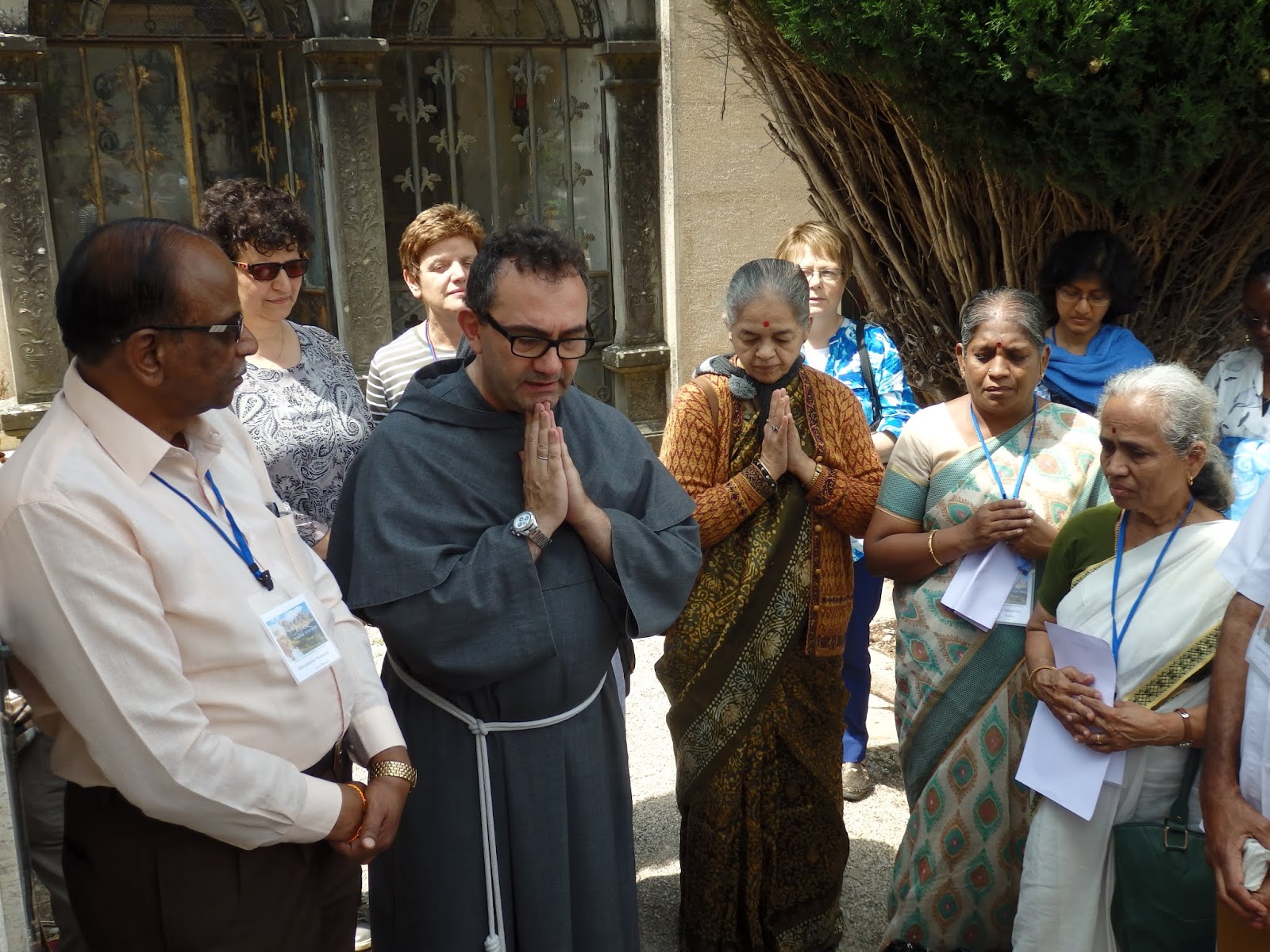 The last stage was Assisi. “We arrived at about 10.30 am. We walked up to the St. Francis Basilica and then on to the cemetery. I could not help but think back to the autumn of 1997 when the town has been hit by an earthquake and many people had been seriously injured. We had climbed to the top of the same hill with Vinu and Ashok, Dr. Aram’s daughter and son. Dr. Aram, a Gandhian teacher, had died some months before and had wanted some of his ashes to be buried in the land of St. Francis who he had greatly admired. Every evening, he used to recite his prayer, ‘Make me an instrument of your peace.’ The pilgrimage then continued to the crypt of the Basilica where we joined the monks as they recited the prayer of the ‘sixth hour’ in front of St. Francis’ tomb. There was a great sense of reflection, fraternity and spirituality. Our friends listened in silence as we prayed: it was a sign that they respected and valued our prayer as much as their own. The story of St. Francis, a man of peace and dialogue, continues to attract people of all faiths and from all over the world. Assisi is the perfect place for dialogue.” Source: blog by Roberto Catalano
The last stage was Assisi. “We arrived at about 10.30 am. We walked up to the St. Francis Basilica and then on to the cemetery. I could not help but think back to the autumn of 1997 when the town has been hit by an earthquake and many people had been seriously injured. We had climbed to the top of the same hill with Vinu and Ashok, Dr. Aram’s daughter and son. Dr. Aram, a Gandhian teacher, had died some months before and had wanted some of his ashes to be buried in the land of St. Francis who he had greatly admired. Every evening, he used to recite his prayer, ‘Make me an instrument of your peace.’ The pilgrimage then continued to the crypt of the Basilica where we joined the monks as they recited the prayer of the ‘sixth hour’ in front of St. Francis’ tomb. There was a great sense of reflection, fraternity and spirituality. Our friends listened in silence as we prayed: it was a sign that they respected and valued our prayer as much as their own. The story of St. Francis, a man of peace and dialogue, continues to attract people of all faiths and from all over the world. Assisi is the perfect place for dialogue.” Source: blog by Roberto Catalano
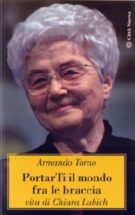
16 July 1949
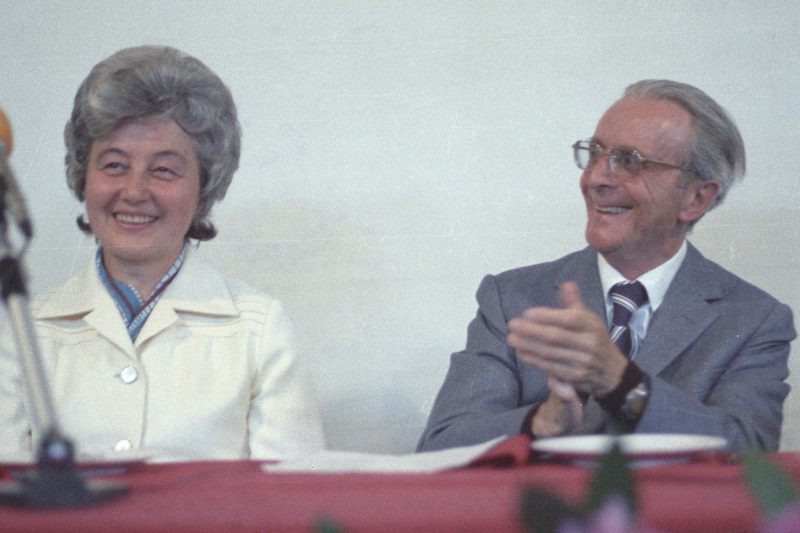 The beginning of a period of major illuminations (of Chiara Lubich) can be said to have begun on July 16, 1949. Igino Giordani had arrived on that day in Tonadico, Italy. He was staying at the Orsinger Hotel and was to hold a conference in the meeting hall of the Capuchins. “Enamoured with Saint Catherine of Siena,” Giordani had always dreamed of finding a consecrated virgin like her whom he could follow. Certain that he had found that person in Chiara, he proposed making a vow of obedience to her, thinking that in this way he would be obeying God. He went on to say that then, the two of them would be able to become saints as a duo like Francis de Sales and Jane Frances de Chantal. Chiara didn’t understand. The Movement didn’t exist and they didn’t talk about their vows. She felt that she had been born for Jesus’s prayer to the Father “May they all may be one”. She was tempted to let go of his idea, but she had the feeling that his words were rooted in a grace that shouldn’t be lost. So, she said to him: “I am nothing. In fact, I want to live like Jesus Forsaken who made himself nothing. You’re also nothing because you live the same way. Well, then, tomorrow we’ll go to church and I’ll say to Jesus Eucharist who will come into my heart as into an empty chalice: ‘Upon my nothingness, you establish unity with Jesus Eucharist in the heart of Foco. And do it in such a way, Jesus, that what comes out is the bond that you have in mind between us.’ And you, Foco, do the same.” That is what they did. Giordani headed for the hall where he had to give his conference, as Chiara felt driven to return to the church. In front of the tabernacle, she was about to pray to Jesus, but, in that very moment, she felt like she couldn’t. She felt that she was totally identified with the Son. She heard herself pronounce the words: “Abba-Father.” She realized that her religious life would have to be different from the way she had lived it up until that moment: no longer turned towards Jesus, but beside Him, her Brother, turned towards the Father.
The beginning of a period of major illuminations (of Chiara Lubich) can be said to have begun on July 16, 1949. Igino Giordani had arrived on that day in Tonadico, Italy. He was staying at the Orsinger Hotel and was to hold a conference in the meeting hall of the Capuchins. “Enamoured with Saint Catherine of Siena,” Giordani had always dreamed of finding a consecrated virgin like her whom he could follow. Certain that he had found that person in Chiara, he proposed making a vow of obedience to her, thinking that in this way he would be obeying God. He went on to say that then, the two of them would be able to become saints as a duo like Francis de Sales and Jane Frances de Chantal. Chiara didn’t understand. The Movement didn’t exist and they didn’t talk about their vows. She felt that she had been born for Jesus’s prayer to the Father “May they all may be one”. She was tempted to let go of his idea, but she had the feeling that his words were rooted in a grace that shouldn’t be lost. So, she said to him: “I am nothing. In fact, I want to live like Jesus Forsaken who made himself nothing. You’re also nothing because you live the same way. Well, then, tomorrow we’ll go to church and I’ll say to Jesus Eucharist who will come into my heart as into an empty chalice: ‘Upon my nothingness, you establish unity with Jesus Eucharist in the heart of Foco. And do it in such a way, Jesus, that what comes out is the bond that you have in mind between us.’ And you, Foco, do the same.” That is what they did. Giordani headed for the hall where he had to give his conference, as Chiara felt driven to return to the church. In front of the tabernacle, she was about to pray to Jesus, but, in that very moment, she felt like she couldn’t. She felt that she was totally identified with the Son. She heard herself pronounce the words: “Abba-Father.” She realized that her religious life would have to be different from the way she had lived it up until that moment: no longer turned towards Jesus, but beside Him, her Brother, turned towards the Father.  Armando Torno, “PortarTi il mondo fra le braccia. Vita di Chiara Lubich”, Città Nuova, Rome, 2011.
Armando Torno, “PortarTi il mondo fra le braccia. Vita di Chiara Lubich”, Città Nuova, Rome, 2011.

GenVerde Tour
 Dates: August 14th and 15th: workshop with young people August 16th: Concert “On the Other Side + young people of the Start Now project” GenVerde Tours
Dates: August 14th and 15th: workshop with young people August 16th: Concert “On the Other Side + young people of the Start Now project” GenVerde Tours
